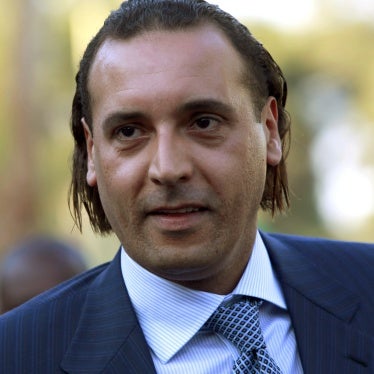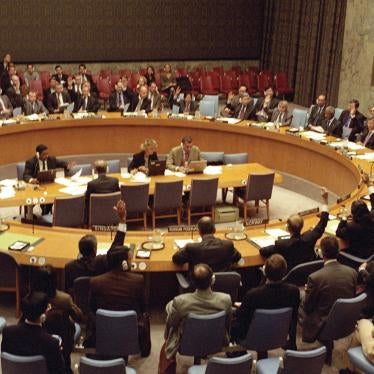(New York) - Saudi authorities should release insolvent debtors from jail, including Tariq Yunis al-Mashharawi, who has been held in Buraiman Prison in Jeddah for close to four years, Human Rights Watch said today.
Al-Mashharawi is being held on a court order that says he owes a Saudi princess US$640,000. He says he does not have the money, which he claims he turned over to his boss at a luxury car dealership, and disputes that he owes her anything. Al-Mashharawi's case is not an isolated one, Human Rights Watch said.
"Throwing a penniless person in prison for a debt is not going to get that money back," said Christoph Wilcke, senior Middle East researcher at Human Rights Watch. "Putting someone in prison should be reserved for real crimes."
Saudi law allows imprisonment for debt but makes an exception if the person is insolvent. International human rights law prohibits such imprisonment, including the Arab Human Rights Charter, which Saudi Arabia ratified in April 2009. Few other countries imprison debtors unless they willfully refuse to pay a debt they have the means to pay.
Al-Mashharawi, a Jordanian, lived in Saudi Arabia for many years. He worked as a salesman for a luxury car dealership owned by Nayif ‘Adnan al-Sharbatli, a Saudi businessman who lives in London. In 2000, Princess Basma bint Sa'ud bin Abd al-‘Aziz, the daughter of former King Sa'ud bin Abd al-‘Aziz, bought several cars from the dealership. Al-Mashharawi says her agent gave him checks to purchase the cars, which he cashed, handing the money to al-Sharbatli.
Soon thereafter, al-Mashharawi fled the kingdom to his native Jordan after what he described as abduction, torture, and threats to his family by a group of men who said they had invested in al-Sharbatli's car business and wanted their money back.
United Arab Emirates officials arrested al-Mashharawi, based on an Interpol warrant for fraud and embezzlement, when he applied for a job in Dubai in late 2006. They deported him to Saudi Arabia, where police in Jeddah confronted him with the people who had allegedly sought his arrest - the same people who had roughed him up six years earlier. But they told police and the prosecutor that they no longer sought his extradition. They had previously won a case against al-Sharbatli, though they couldn't receive the amount ordered by the court because he was outside of the kingdom.
On February 12, 2007, officials told al-Mashharawi to prepare to be deported, but instead drove him to Buraiman prison. Over the next six months, the Summary Court halted consideration of the criminal case until completion of the civil case against him.
Al-Mashharawi remained in prison, though. An agent for the princess visited him in August, demanding he pay her three million Saudi riyals (SAR), equivalent to $800,000. The princess filed a civil case, and he was ordered to pay SAR2,492,000 ($664,553), based solely - according to the verdict - on al-Mashharawi's admission that he received and cashed the checks, which the bank had verified.
Al-Mashharawi says he has documents showing that al-Sharbatli, the owner of the car dealership, was financially liable for his actions as an employee and that the princess got her money back. He also says he has never been allowed to show the court he cannot pay. He told Human Rights Watch that his two wives and four children had to move to Syria, where living expenses were lower, because he could not provide for them.
Since then, the case has gone back and forth between the Jeddah court and the Mecca Appeals Court, finally being sent to a new judge. The new judge scheduled a hearing for August 2010, but then told al-Mashharawi's lawyer, Wa'il al-Sa'idi, that he needed more time to study the case documents.
When the lawyer complained that the judge already had more than a year to do so while al-Mashharawi remained in prison, the judge ordered al-Mashharawi to pay the full amount of the previous judgment or remain in prison, the lawyer told Human Rights Watch.
Human Rights Watch has learned of numerous people who are in Saudi prisons solely because they cannot pay a debt. In September 2008, a Lebanese man told Human Rights Watch he had been jailed for nine months because the Saudi company he worked for claimed he owed them SAR 200,000 ($53,333) in rents from buildings he managed for the company. The courts did not find any criminal activity, but kept him in jail during the civil proceedings, and then ruled he had to remain in jail if he could not pay the sum. He could not afford a lawyer, and the court did not allow him to prove he was unable to pay.
In March 2007, an Egyptian biomedical engineer, jailed in Jeddah's Buraiman prison, said his employer had accused him of embezzlement. A court found him not guilty, but the company owner pursued a civil claim that kept the Egyptian in prison. Saudi authorities later deported the man.
A Somali man in Buraiman prison told Human Rights Watch in March 2007 that he had spent the last five years there, and four years before that in the nearby Ruwais prison, because his Saudi sponsor wanted him to pay SAR1.3 million ($346,666) for construction materials he claimed the Somali man had improperly sold. The Somali man called Human Rights Watch from Mogadishu months later to say he had been deported.
On April 15, 2009, Saudi Arabia was the first country to ratify the Arab Charter for Human Rights, which in article 18 prohibits "imprisoning a person whose insolvency to satisfy a debt arising from a contractual obligation has been judicially proven." International human rights law, in article 11 of the International Covenant on Civil and Political Rights (ICCPR), also prohibits jailing insolvent debtors, although Saudi Arabia is one of only about 30 countries that have not signed this covenant.
Saudi law allows imprisonment for debt, though the creditor has the right to release the debtor, under article 8.a. of Saudi Arabia's Organizational Regulation of Procedures for Claiming Personal Rights (1985). Article 230 of the Law on Procedure before Sharia Courts (2000), the civil procedure code, also affirms the possibility of detention for people sentenced to pay back a debt.
However, the law makes an exception for proven insolvency, in which case "it shall be obligatory to release [the debtor] and abstain from his prosecution," unless the debt is the result of "crimes he has intentionally committed" (article 18 of the Organizational Regulation). Article 231 of the civil procedure code reaffirms that a court must address the question of insolvency if a debtor refuses to pay a court-ordered settlement "by reason of insolvency."
Many countries around the world have used civil imprisonment, or imprisonment for debt, in the past, but today only exceptional cases involving willful refusal to comply with a court order, such as a refusal to pay for alimony ordered by the court while having the means to do so, are recognized as potentially justifying imprisonment.
In a landmark 1995 South African case abolishing the practice, the Constitutional Court found that "sending people to jail for not paying their debts" is neither reasonable, justifiable, or necessary "in a democratic society based on freedom and equality."
In 2006, the States of Jersey, part of the United Kingdom, asked the UK government to withdraw its reservation to article 11 of the ICCPR because the law in Jersey had changed regarding permissible imprisonment for debt.
"Saudi Arabia is thumbing its nose at the Arab human rights charter it promised only last year it would uphold," Wilcke said. "Where a princess is involved, the courts feel free to ignore Saudi Arabia's own law that prohibits indefinitely detaining insolvent debtors."
In September 2010, Dr. Ibrahim al-Shiddi, head of the human rights and petitions committee for the appointed Saudi Shura Council, was elected for a second term as the head of the Permanent Arab Committee for Human Rights at the League of Arab States. He promised to "heed the rights charter," Al-Hayat newspaper wrote.







